|
National Finals 2002:
Championship Section
A Dream Quintet:
T he top euph players to watch out for this year
There is little doubt that Philip Wilby has a thing for euphonium
players. Just about every major work he has created has featured
some sort of extended solo for the instrument, and more often than
not, he has made those features into extended quasi cadenzas that
have required players to explore the very limits of their techniques.
From “Dove Descending” to “Revelation”
to “Atlantic” and “Paganini Variations”
the euphonium part has invariably been seen as the fulcrum of his
works. Before the arrival of Wilby, the most daunting euphonium
part was to be found in perhaps “Le Roi d’Y’s”,
but since the composers works were first used at the National Finals
in 1992, his almost devilish creations are now the benchmark tests
for every budding euphonium soloist. If your band hasn’t got
a player who can perform these cadenzas, then you can just about
say goodbye to your chances of making a mark at a contest.
This time it’s “Masquerade” – and perhaps
the hardest of all his euphonium features. The piece is difficult
enough, but just after letter J in a section marked, “Midnight
Strikes” the moment of truth arrives for player and band alike.
The next minute will possibly change the players life for ever.
It is a “Tour de Force” of immense proportions and
it explores just about every aspect of technique and musicality
a player can muster. Only the very best will do it justice, although
all the bands here this year have players who can on their day handle
Wilby’s tester. Given that most will have nerves jangling
like loose change in a clown’s pocket, all that practice they
have done at home and in the bandroom will have to pay off. Some
will triumph, some will simply survive. What ever happens, all the
players deserve a pat on the back and our congratulations, for they
would have challenged head on the hardest bit of euph writing for
many a year.
Every band as we have said have fine players to tackle the task
ahead, but for us there are five young players who we think could
really make the difference between victory and defeat. There is
a lot resting on these young shoulders, but we are sure all of them
will shine. Who will sparkle the most though, we’ll have to
wait and see on Saturday – it should though be a rare treat.
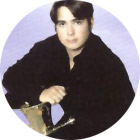 David
Childs David
Childs
Buy As You View Cory
A young man with the world at his feet. There are few examples
in life when a son has outshone his famous father (look at what
happened to the son of Donald Bradman or Pele), but David Childs
has in his meteoric career just about done it with knobs on. The
21-year-old is currently performing with the British Open Champions
after taking over there following the retirement of Nigel John this
year. He is also completing his educational studies in Wales, so
the move from his previous band, CWS Glasgow seemed the perfect
move.
Prior to this he was part of the amazing revival at Brighouse and
Rastrick where he was part of that bands “Purple” patch
of success that included two National Championship wins, a Masters
success and a European title. He made his name in his own right
there as a very special talent and this was later confirmed when
he won the BBC Brass Young Musician of the Year title 2000. His
performance of Philip Wilby’s “Concerto for Euphonium”
in the Grand Final was mesmeric and so nearly took the overall title.
Since then he has released two CD’s entitled “Prodigy”
and “Metamorphosis” which have been well received and
his career has just moved in an upward direction ever since. His
father won the solo prize at the British Open when “Masquerade”
was last used, so there is a precedent he will wish to emulate.
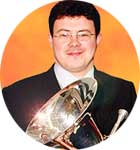 David
Thornton David
Thornton
Black Dyke
What a player. Ever since David Thornton took up playing the euphonium
at the age of 8 (he missed out on having a violin at school, so
opted for the euph – what a choice) he has been a young man
setting amazing new standards.
He passed his Grade 7 at the age of 11 and by the age of 13 he
was a pupil at the world famous Chetham’s School in Manchester
– a breeding ground of exceptional talent. During his five
years there he became something of a prodigy and this led to his
first experience of playing with a top class brass band when aged
13 he played solo euphonium with the now defunct Kennedy Swinton
band at the All England Masters in 1993. Next he went to Tredegar
under Nicholas Childs, a man who recognised his talent at the National
Youth Brass Band of Great Britain and played solo euphonium with
the band when they came runners up at the National Finals in 1993.
Then it was off to Wingates before a happy spell with Williams
Fairey before another link with Nicholas Childs as he took over
the solo euphonium chair at Black Dyke following the retirement
of Bob Childs. It was the position he was destined for, and since
taking over he has made it his own with a series of performances
in contests and concerts that have been invariably breathtaking.
The current International Euphonium Player of the Year is a superb
all round player – a winner of International solo competitions
yet a band player who is the cornerstone of the revitalised Black
Dyke. Listen out for him.
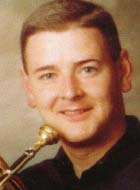 Morgan
Griffiths Morgan
Griffiths
Williams Fairey
The euphonium players euphonium player. Morgan Griffiths is perhaps
the most complete brass band euphonium player of the modern generation
– a performer of rare gifts but a man who seems to maintain
the tradition of lyrical playing that belongs to the golden age
of great players of yesteryear such as Trevor Groom or John Clough.
He is a complete musician on his instrument.
A Yorkshireman currently performing with distinction with the Lancashire
based Williams Fairey Band, Morgan Griffiths hails from a strong
banding family, and as a young man benefited from being taught by
the imperious Geoffrey Whitham (not a bad euph player himself!).
He became the youngest ever person to be appointed the Principal
Euphonium of Black Dyke when David King recognised that here was
a very special player indeed and one with the cool temperament who
could take any challenge in his stride.
Following David King’s move to the newly formed Yorkshire
Building Society Band, Morgan followed and for the next ten years
became an internationally acclaimed performer. The immense success
of the band was due in no small part to the performances of Morgan
Griffiths and in 1999 he was awarded the title of International
Euphonium Player of the Year. In 1999 he also released his first
CD, entitled “Voice of the Euphonium” which was widely
greeted with fine reviews. In 2002 he moved to Williams Fairey and
further enhanced his recognised reputation by winning the first
ever 4BarsRest “Best Instrumentalist” at the All England
Masters Championships.
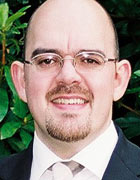 Glyn
Williams Glyn
Williams
Fodens Richardson Band
The virtuoso euphonium player. This man can play just about any
instrument he can put his lips to – and play it brilliantly.
Those lucky to hear him live at the 2001 Brass in Concert Championships
in Spennymoor were simply blown away, as Glyn performed a set of
variations on everything from a soprano cornet to a xylophone, with
a few quick interludes on the tenor horn, baritone, cornet and euph
thrown in for good measure. It was simply mind boggling stuff.
There is so much more to him as a player though than this amazing
party trick. He has been at Fodens close on ten years and has been
an integral part in maintaining the band as one of the premier outfits
in Europe. In concerts he is simply irresistible, whilst on the
contest stage he has few, if any peers. The Welshman started his
career with the Towyn Silver Band, before moving to the Royal Oakley
and Menai Bridge Bands before he left home to complete his studies
at Salford University. Here he became the awesome player who won
the prestigious Harry Mortimer Prize, Best Instrumentalist at the
Urdd Eisteddfod and Best Soloist at the French Open and Brass in
Concert Entertainment Contests. (Something he has of course repeated)
He is a player who has it all – great sound, brilliant technique
and a temperament that is as cool as the proverbial cucumber. He
has been appointed Professor of the Euphonium at Salford University
and has been a tutor on both the Great Britain and National Youth
Brass Bands of Wales. He has also appeared as a soloist all over
the world, from Brazil to Crete from France and back home in Wales.
His is a very rare talent indeed so don’t miss him.
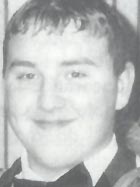 Michael
Howley Michael
Howley
Yorkshire Building Society Band
Here is a young man with a very big future in front of him. Being
a principal euphonium player for a top section brass band is one
thing – being solo euphonium for the current European Champions
and one of the very best bands in Europe is something else!
Michael Howley has come a very long way in a very short space of
time and is seen by many people as one of the most talented young
players in top class banding at the moment. He first came to notice
as the solo euphonium player with the Rothwell Temperance Band,
although he first cut his teeth as a member of the Gawthorpe ’85
Band which he joined when aged 12. There he came under the guidance
of the MD David Roberts who groomed him slowly, whilst he also benefited
from the tuition he received as a member of the National Youth Band
of Great Britain. Those impressions certainly made a mark with Williams
Fairey and he joined the band in 2000 following the departure of
David Thornton to Black Dyke. Here he learned more in a year than
he had done in the previous ten about playing at the topmost level
where expectations are so high. Although he found the period difficult,
it benefited him enormously so when the chance came to understudy
Morgan Griffths at YBS he jumped at the chance.
Here he came under the eye of David King and when Morgan Griffiths
left to go the Williams Fairey, the MD had no hesitation in choosing
his 2nd Euphonium to step into filling one of the most prestigious
and demanding positions in the banding world. Since this time he
has flourished and his performances at this year’s Masters,
European and Open have confirmed that it was the correct choice.
© 4BarsRest
 back
to top back
to top
|

